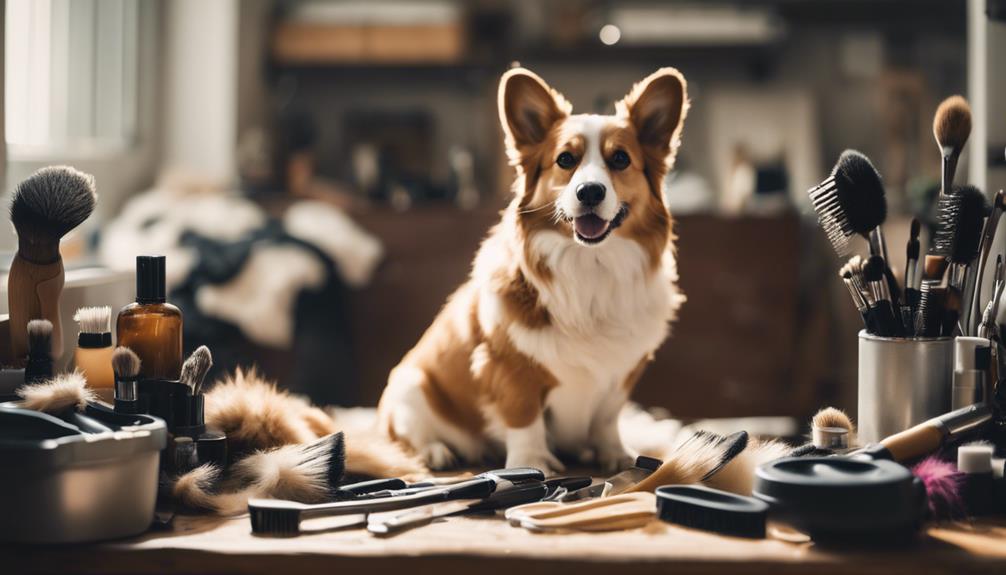Grooming a Corgi requires a thoughtful approach, as neglecting key aspects can lead to various health issues for these beloved pets. Common mistakes, such as overlooking regular brushing and ignoring ear care, can significantly impact a Corgi's well-being. Additionally, improper nail trimming and the use of unsuitable grooming products may exacerbate discomfort. Understanding the nuances of Corgi grooming is essential for maintaining their health and happiness. However, many owners remain unaware of the intricate details involved, which could make all the difference in their grooming routine. What follows may change your perspective on proper Corgi care.
Overlooking Regular Brushing
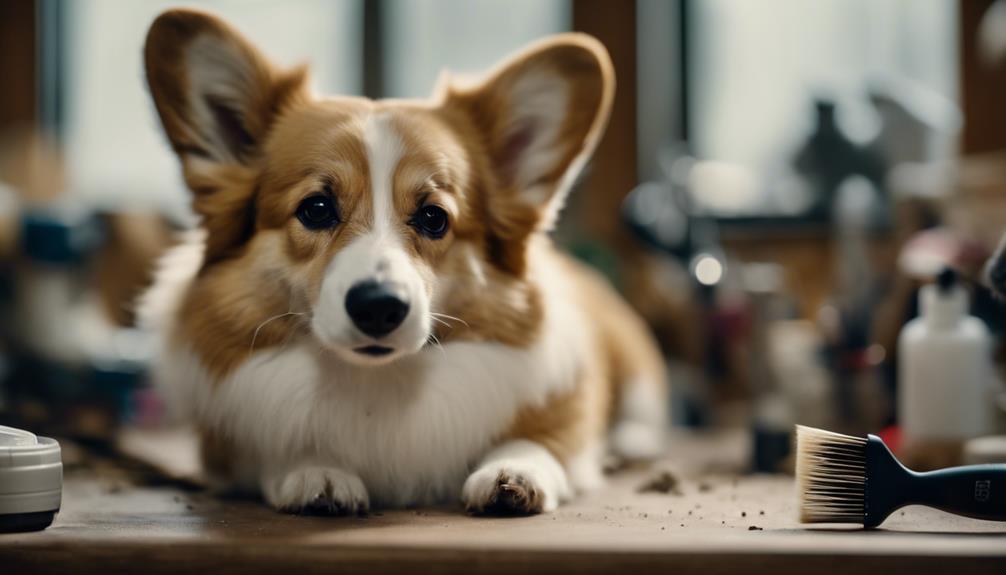
Neglecting regular brushing can lead to matting and skin issues in Corgis, making it essential for their overall health and coat maintenance. Proper grooming involves using effective brushing techniques and appropriate grooming tools.
For Corgis, a slicker brush is ideal for removing loose fur and preventing tangles. Additionally, a comb can help reach the undercoat, ensuring a thorough clean.
To maintain a healthy coat, it is recommended to brush your Corgi at least once a week. This not only removes dirt and debris but also stimulates the skin, promoting natural oil production. Regular brushing can significantly reduce shedding and enhance your dog's comfort.
Ignoring Ear Care
Proper ear care is crucial for Corgis, as their unique ear structure makes them more susceptible to infections and debris accumulation.
Regular routine ear cleaning is essential for maintaining your Corgi's health. Neglecting this important aspect can lead to painful ear infections, which are not only uncomfortable for your pet but can also result in costly veterinary visits.
To ensure effective ear infection prevention, check your Corgi's ears weekly. Look for signs of redness, swelling, or an unusual odor.
Gently clean the outer ear with a vet-approved solution and a cotton ball, avoiding deep insertion into the ear canal.
Establishing a consistent ear care routine will help keep your Corgi happy and healthy, preventing future complications and promoting overall well-being.
Neglecting Nail Trimming
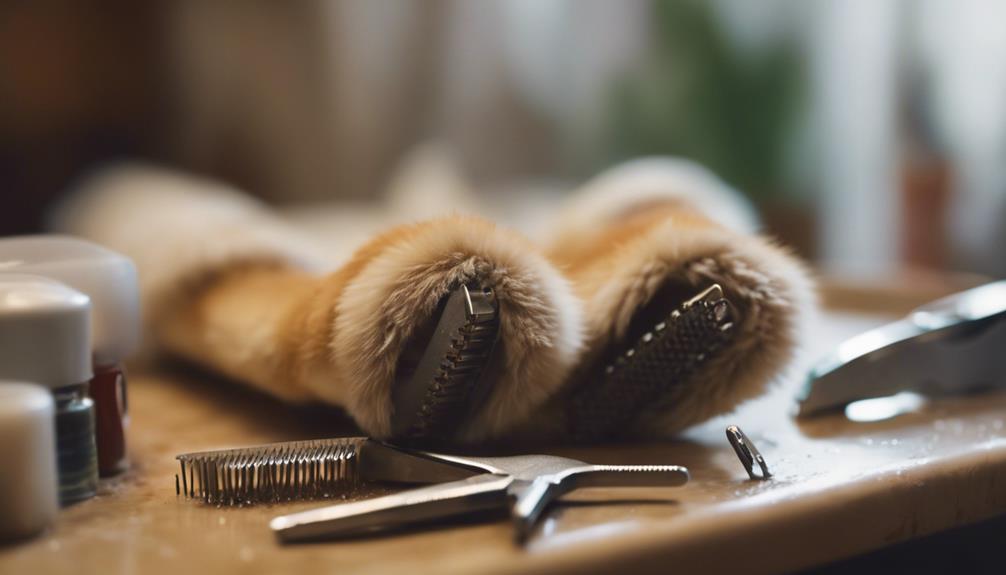
Regular nail trimming is essential for maintaining your Corgi's overall health and comfort. Neglecting this important task can lead to painful overgrown nails, which can affect their walking and overall well-being.
To avoid this mistake, consider using proper nail trimming techniques, such as a gentle grinder or quality clippers. Hold your Corgi's paw firmly but gently, ensuring they feel secure. It's helpful to trim a small amount regularly rather than waiting for the nails to become too long.
Here are some nail care tips:
- Trim nails every 3-4 weeks.
- Reward your Corgi with treats to make the experience positive.
Using Incorrect Shampoo
When grooming your Corgi, using the wrong shampoo can lead to serious issues.
Many commercial shampoos contain harsh ingredients that can irritate your dog's skin, while others may not account for specific skin sensitivities that Corgis often have.
It is crucial to select a gentle, dog-specific shampoo that caters to your pet's unique needs to ensure a safe and pleasant grooming experience.
Choosing Harsh Ingredients
Selecting a shampoo with harsh ingredients can lead to skin irritation and discomfort for your Corgi, undermining the overall grooming experience. Many common dog shampoos contain sulfates, parabens, and artificial fragrances that may strip natural oils from your pet's skin.
To ensure a positive grooming session, it is crucial to read ingredient labels carefully. Opt for products that feature natural alternatives, such as oatmeal or aloe vera, which are gentler and can soothe your dog's skin.
Additionally, consider shampoos specifically formulated for sensitive skin, as they often avoid harsh chemicals. By choosing the right shampoo, you can promote a healthy coat and a happier grooming experience for your Corgi, ensuring they feel comfortable and loved.
Ignoring Skin Sensitivities
Ignoring skin sensitivities by using an incorrect shampoo can exacerbate existing issues, leading to further irritation and discomfort for your Corgi. Many shampoos contain harsh chemicals that can strip natural oils, affecting skin hydration. It is crucial to choose products specifically designed for dogs, particularly those with sensitive skin.
Pay attention to allergy awareness; look for hypoallergenic formulas that minimize the risk of allergic reactions. Ingredients such as oatmeal or aloe vera can help soothe irritated skin. Always conduct a patch test to ensure your Corgi does not react negatively.
Regular grooming with the right shampoo not only keeps your pet clean but also promotes healthy skin and coat, providing essential hydration for their overall well-being.
Skipping Bathing Routine
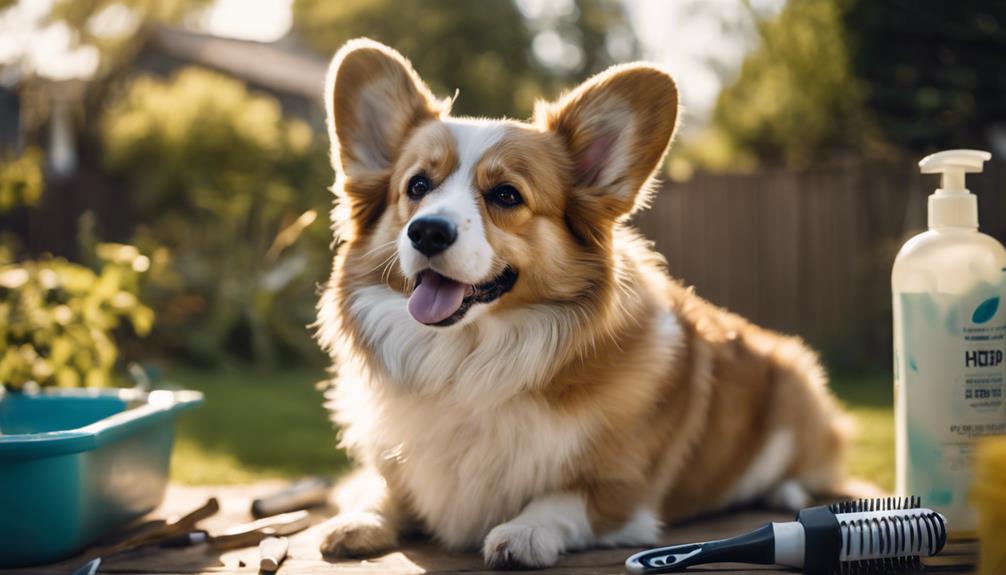
Maintaining a consistent bathing routine for your Corgi is essential for their overall health and hygiene.
Establishing a schedule, using appropriate products, and monitoring your dog's skin health are key factors in effective grooming.
Skipping baths can lead to discomfort and skin issues, making it important to prioritize this aspect of care.
Establish a Schedule
Establishing a consistent bathing routine is essential for keeping your Corgi's coat healthy and free from dirt and parasites. Regular grooming frequency helps maintain their coat's natural oils, ensuring it remains shiny and smooth.
A well-planned schedule ensures that you do not skip baths, which can lead to skin irritations and unpleasant odors. Aim for bathing your Corgi every four to six weeks, adjusting as necessary based on activity level and coat condition.
Schedule consistency is key; set reminders to establish a habit. This will not only keep your Corgi looking great but also make grooming a positive experience for both of you.
Use Appropriate Products
Selecting the right grooming products is vital to complement your established bathing routine and ensure your Corgi's coat remains healthy and well-maintained.
Using appropriate grooming tools, such as brushes and combs specifically designed for their coat type, can prevent matting and reduce shedding. Always prioritize product safety by choosing shampoos and conditioners free from harsh chemicals. Look for pet-friendly labels that emphasize natural ingredients.
Additionally, consider using a detangling spray to ease grooming sessions. Be cautious of any products that may irritate your Corgi's skin.
A well-informed approach to selecting grooming products not only enhances your pet's appearance but also contributes significantly to their overall health and comfort during grooming.
Monitor Skin Health
Regularly monitoring your Corgi's skin health is essential, especially when grooming routines, such as bathing, are skipped. Without regular bathing, dirt and oils can build up, leading to skin irritation and dryness.
Check your Corgi's skin for any unusual redness, bumps, or flakiness, as these can indicate underlying issues.
Ensure proper skin hydration by providing fresh water and a balanced diet. This helps maintain skin elasticity and overall health.
Additionally, pay attention to signs of allergies, which may manifest as itching or excessive scratching. Allergy management can include avoiding known irritants and consulting your veterinarian for appropriate treatments.
Improper Tooth Cleaning
Neglecting proper tooth cleaning can lead to significant dental issues in Corgis, underscoring the importance of a consistent oral hygiene routine.
Regular brushing is essential for maintaining tooth health and preventing plaque buildup, which can result in gum disease and tooth loss. It's advisable to use a toothbrush designed specifically for dogs, along with toothpaste that is safe for them.
In addition to brushing, incorporating dental treats into their diet can help promote oral hygiene. These treats are formulated to reduce plaque and tartar while freshening breath.
Disregarding Skin Health
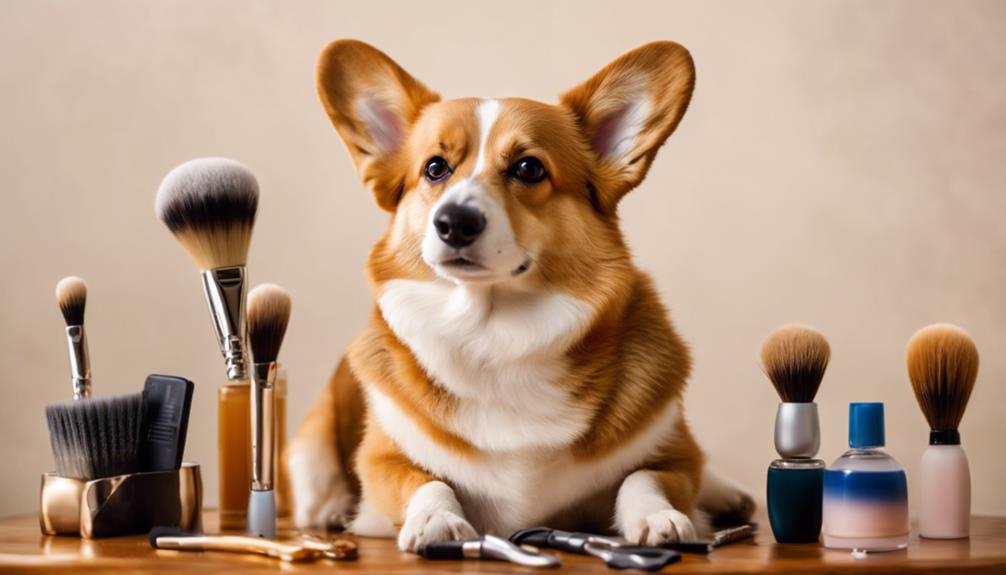
Disregarding skin health in Corgis can lead to a range of issues, including irritation, infections, and allergic reactions, making it crucial to prioritize their dermatological care.
Corgis are prone to skin allergies, which can result from environmental factors or food sensitivities. Regular grooming helps to detect early signs of these allergies, such as redness or excessive itching.
Maintaining a proper moisture balance is essential for their skin. Over-bathing can strip natural oils, leading to dryness, while insufficient grooming can cause matting, trapping dirt and moisture.
To promote skin health, consider the following:
- Use hypoallergenic shampoos.
- Regularly check for signs of irritation.
Prioritizing skin health ensures your Corgi remains comfortable and happy.
Forcing Grooming Sessions
Forcing grooming sessions on Corgis can create negative associations with the grooming process, leading to increased stress and resistance during future appointments. This can result in grooming anxiety, making it a challenging experience for both the dog and the owner.
Instead of forcing your Corgi, consider using positive reinforcement techniques. Reward your dog with treats, praise, or playtime after successful grooming sessions. This will help them associate grooming with pleasant experiences rather than discomfort.
Gradually introduce grooming tools and techniques, allowing your Corgi to become familiar with the process. Remember, patience is key.
Forgetting Seasonal Needs
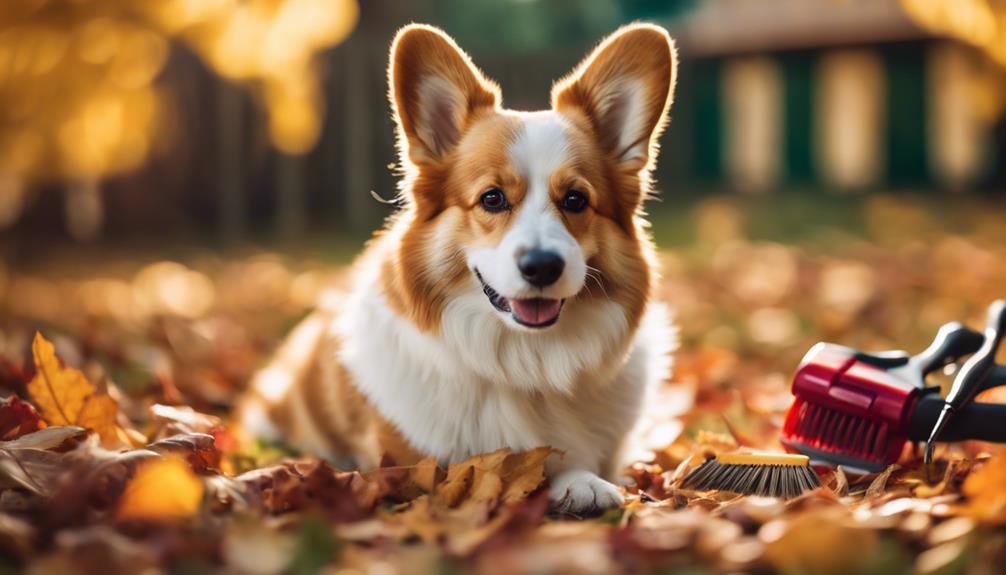
Understanding your Corgi's grooming needs throughout the year is vital, as seasonal changes can significantly impact their coat and overall well-being.
Corgis experience seasonal shedding, particularly in spring and fall, when they lose their undercoat to adapt to different weather conditions. To manage this, regular brushing during these shedding periods is essential to remove loose fur and prevent matting.
Additionally, adjusting grooming frequency based on the weather is crucial. In warmer months, shorter grooming sessions might be necessary to keep them cool, while winter grooming should focus on preventing snow and ice buildup in their fur.

